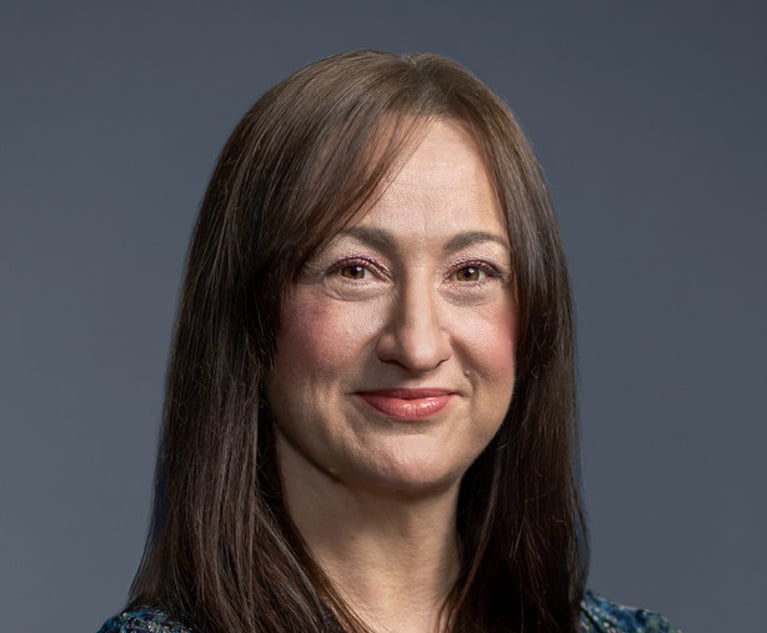Mayer Brown partner convicted in $2.4bn Refco fraud
Mayer Brown partner Joseph Collins has been found guilty of conspiracy and four other charges in connection with a massive fraud at now-bankrupt Refco, writes the New York Law Journal. Collins, who testified in his own defence that he was kept in the dark about more than $2.4bn (£1.5bn) in debt hidden by officials at the financial services firm, bowed his head as the jury foreman on Friday (10 July) recited the guilty verdicts before Southern District of New York Judge Robert Patterson.
July 13, 2009 at 05:57 AM
5 minute read
Mayer Brown partner Joseph Collins has been found guilty of conspiracy and four other charges in connection with a massive fraud at now-bankrupt Refco, writes the New York Law Journal.
Collins, who testified in his own defence that he was kept in the dark about more than $2.4bn (£1.5bn) in debt hidden by officials at the financial services firm, bowed his head as the jury foreman on Friday (10 July) recited the guilty verdicts before Southern District of New York Judge Robert Patterson.
The verdict came during the seventh day of sometimes-heated deliberations by a jury that had been confined to a 15th floor courtroom for almost two months. Citing "acrimony" among jury members Judge Patterson insisted that each juror be polled individually to ensure no votes were made under duress.
Collins was convicted of a single count of conspiracy to commit securities fraud, bank fraud, wire fraud, money laundering and make false filings with the Securities and Exchange Commission and four substantive counts – two each of securities fraud and wire fraud.
Collins, who is scheduled to be sentenced on 3 November, technically faces a maximum of five years on the conspiracy count and 20 years on each of the substantive counts. However, he is likely to receive far less.
The verdict came in shortly after the jury sent a note to Judge Patterson that it was deadlocked on several counts. Over the objection of defense lawyer William Schwartz of Cooley Godward Kronish, the judge said he was willing to accept a partial verdict and sent word back to the jury.
The jurors then filed into the courtroom and announced their guilty verdict on five counts. Patterson thanked them for their service and declared a mistrial on nine additional counts: two on wire fraud, two on making false filings to the SEC and five on bank fraud.
The conviction of Collins, who is on leave from Mayer Brown, where he headed the firm's derivatives group, came with the assistance of government cooperators, Refco's ex-chief financial officer Robert Trosten and former executive vice-president Santo Maggio.
Both men have pleaded guilty and are awaiting sentencing. Former Refco chairman and chief executive Phillip Bennett pleaded guilty in the case and is serving 16 years in prison. Former Refco Group Ltd. president Tone Grant was found guilty by a federal jury and is now serving a 10-year prison sentence.
The prosecution put both Trosten and Maggio on the stand to place Collins at the centre of the action, saying he was well aware that the company would not be disclosing hidden debt.
Collins responded to their accounts and that of other witnesses with several days of his own testimony, telling the jury that Refco officials had lied to him and insisting that his job was not to police the company.
Collins testified that he prepared documents for back-to-back loans from Refco to hedge funds and other customers who would, in turn, send money to a holding company partially owned by Bennett, RGHI.
He claimed he was unaware Refco was also parking debt of its own at RGHI in a series of sham loan transactions that were designed to hide the true financial condition from auditors. The debt was also hidden when the company obtained a credit facility from JPMorgan Chase, when a majority stake in Refco was purchased through a leveraged buyout by Thomas H Lee Partners in 2004, and when people bought shares in Refco during an initial public offering in 2005, right before the fraud was exposed and the company plunged into bankruptcy.
Collins, discussing the back-to-back loans, said they were routine transactions he delegated to an associate.
The Refco account managed by Collins took up the lion's share of his billable hours at Mayer Brown. The defense team put his billing records into evidence to show how little time he spent on the questionable transactions and to emphasize another point made by Schwartz in his opening argument – that while Bennett and others used Refco to fund a lavish lifestyle, "not one cent" of the fraud proceeds went to Collins and he therefore had no reason to lie.
But assistant US attorney Christopher Garcia told the jury that same day that Collins had more than an adequate motive to "lie for Refco" because the company was "his biggest client" from 1997 through its collapse.
"This man made more than $40m (£25m) for his firm," Garcia said.
Assistant US Attorney Nicholas Goldin also prosecuted the case.
The New York Law Journal is a US sister title of Legal Week.
For more comment on the Refco fraud click here.
This content has been archived. It is available through our partners, LexisNexis® and Bloomberg Law.
To view this content, please continue to their sites.
Not a Lexis Subscriber?
Subscribe Now
Not a Bloomberg Law Subscriber?
Subscribe Now
NOT FOR REPRINT
© 2025 ALM Global, LLC, All Rights Reserved. Request academic re-use from www.copyright.com. All other uses, submit a request to [email protected]. For more information visit Asset & Logo Licensing.
You Might Like
View All
MoFo Launches in Amsterdam: Exclusive Interview with Global Chair Eric McCrath
2 minute read
Clifford Chance Boosts Private Credit Offering With Mayer Brown Partner Duo
2 minute read

Ex-Mayer Brown Corporate Lawyer Leads Race for German Chancellor in Snap Election
4 minute readTrending Stories
- 1The Importance of Contractual Language in Analyzing Post-Closing Earnout Disputes
- 2People in the News—Jan. 8, 2025—Stevens & Lee, Ogletree Deakins
- 3How I Made Partner: 'Avoid Getting Stuck in a Moment,' Says Federico Cuadra Del Carmen of Baker McKenzie
- 4Legal Departments Dinged for Acquiescing to Rate Hikes That 'Defy Gravity'
- 5Spalding Jurors Return $12M Verdict Against State Farm Insurance Client
Who Got The Work
Michael G. Bongiorno, Andrew Scott Dulberg and Elizabeth E. Driscoll from Wilmer Cutler Pickering Hale and Dorr have stepped in to represent Symbotic Inc., an A.I.-enabled technology platform that focuses on increasing supply chain efficiency, and other defendants in a pending shareholder derivative lawsuit. The case, filed Oct. 2 in Massachusetts District Court by the Brown Law Firm on behalf of Stephen Austen, accuses certain officers and directors of misleading investors in regard to Symbotic's potential for margin growth by failing to disclose that the company was not equipped to timely deploy its systems or manage expenses through project delays. The case, assigned to U.S. District Judge Nathaniel M. Gorton, is 1:24-cv-12522, Austen v. Cohen et al.
Who Got The Work
Edmund Polubinski and Marie Killmond of Davis Polk & Wardwell have entered appearances for data platform software development company MongoDB and other defendants in a pending shareholder derivative lawsuit. The action, filed Oct. 7 in New York Southern District Court by the Brown Law Firm, accuses the company's directors and/or officers of falsely expressing confidence in the company’s restructuring of its sales incentive plan and downplaying the severity of decreases in its upfront commitments. The case is 1:24-cv-07594, Roy v. Ittycheria et al.
Who Got The Work
Amy O. Bruchs and Kurt F. Ellison of Michael Best & Friedrich have entered appearances for Epic Systems Corp. in a pending employment discrimination lawsuit. The suit was filed Sept. 7 in Wisconsin Western District Court by Levine Eisberner LLC and Siri & Glimstad on behalf of a project manager who claims that he was wrongfully terminated after applying for a religious exemption to the defendant's COVID-19 vaccine mandate. The case, assigned to U.S. Magistrate Judge Anita Marie Boor, is 3:24-cv-00630, Secker, Nathan v. Epic Systems Corporation.
Who Got The Work
David X. Sullivan, Thomas J. Finn and Gregory A. Hall from McCarter & English have entered appearances for Sunrun Installation Services in a pending civil rights lawsuit. The complaint was filed Sept. 4 in Connecticut District Court by attorney Robert M. Berke on behalf of former employee George Edward Steins, who was arrested and charged with employing an unregistered home improvement salesperson. The complaint alleges that had Sunrun informed the Connecticut Department of Consumer Protection that the plaintiff's employment had ended in 2017 and that he no longer held Sunrun's home improvement contractor license, he would not have been hit with charges, which were dismissed in May 2024. The case, assigned to U.S. District Judge Jeffrey A. Meyer, is 3:24-cv-01423, Steins v. Sunrun, Inc. et al.
Who Got The Work
Greenberg Traurig shareholder Joshua L. Raskin has entered an appearance for boohoo.com UK Ltd. in a pending patent infringement lawsuit. The suit, filed Sept. 3 in Texas Eastern District Court by Rozier Hardt McDonough on behalf of Alto Dynamics, asserts five patents related to an online shopping platform. The case, assigned to U.S. District Judge Rodney Gilstrap, is 2:24-cv-00719, Alto Dynamics, LLC v. boohoo.com UK Limited.
Featured Firms
Law Offices of Gary Martin Hays & Associates, P.C.
(470) 294-1674
Law Offices of Mark E. Salomone
(857) 444-6468
Smith & Hassler
(713) 739-1250







